162 CD / Hugo Wolf
Description
Marret Winger recently graduated in Hamburg with honours. She and her accompanist Steffen Hartmann have outstanding references to show from artists such as Elisabeth Schwarzkopf, Dietrich Fischer-Dieskau and others. However, what recommended them for a TACET recording was the standard of the chamber music which they perform together. To demonstrate this they have recorded the “Keller Lieder” (Six Poems by Gottfried Keller) by Hugo Wolf, which many artists wisely steer clear of because of their difficulties and dangerous pitfalls.
9 reviews for 162 CD / Hugo Wolf
You must be logged in to post a review.



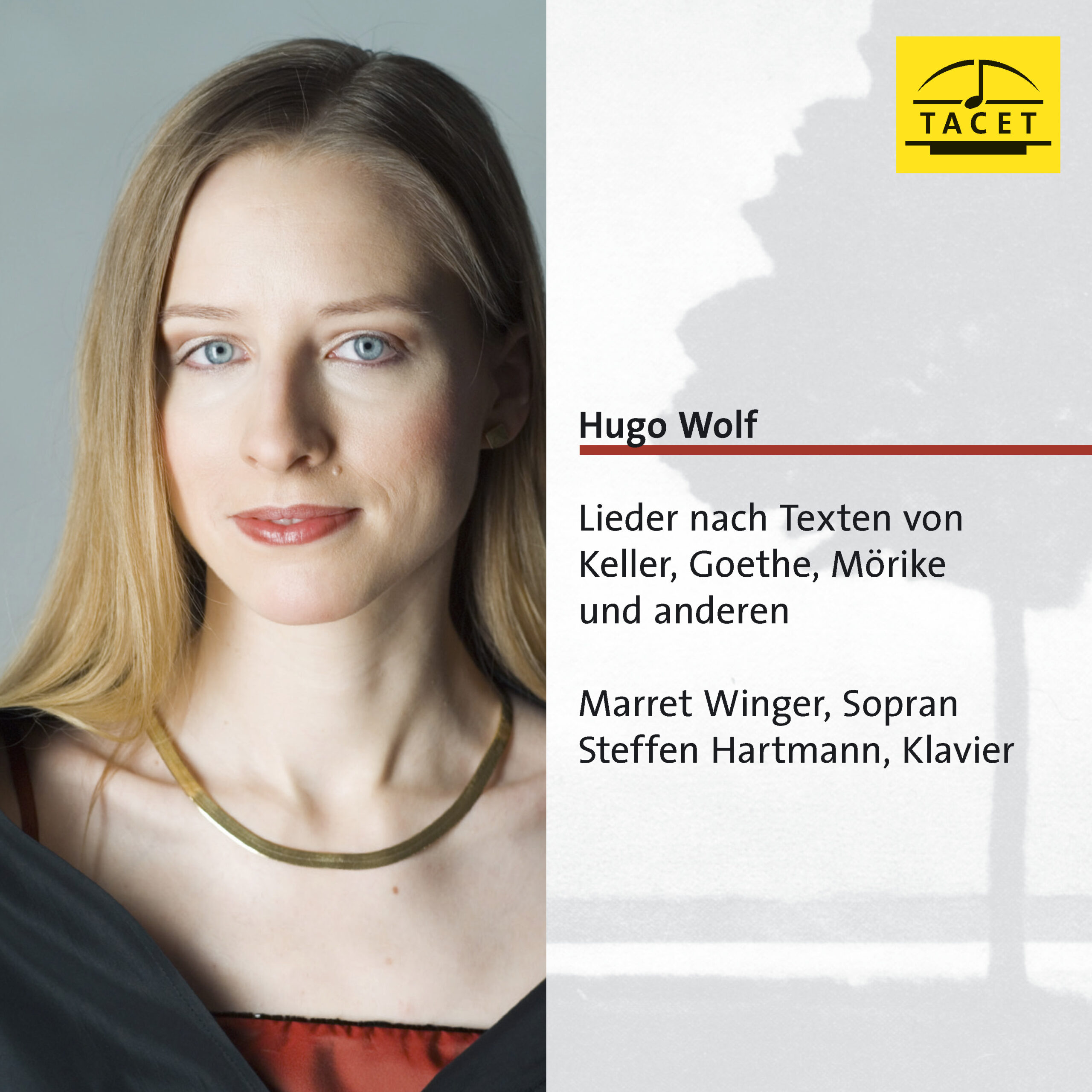
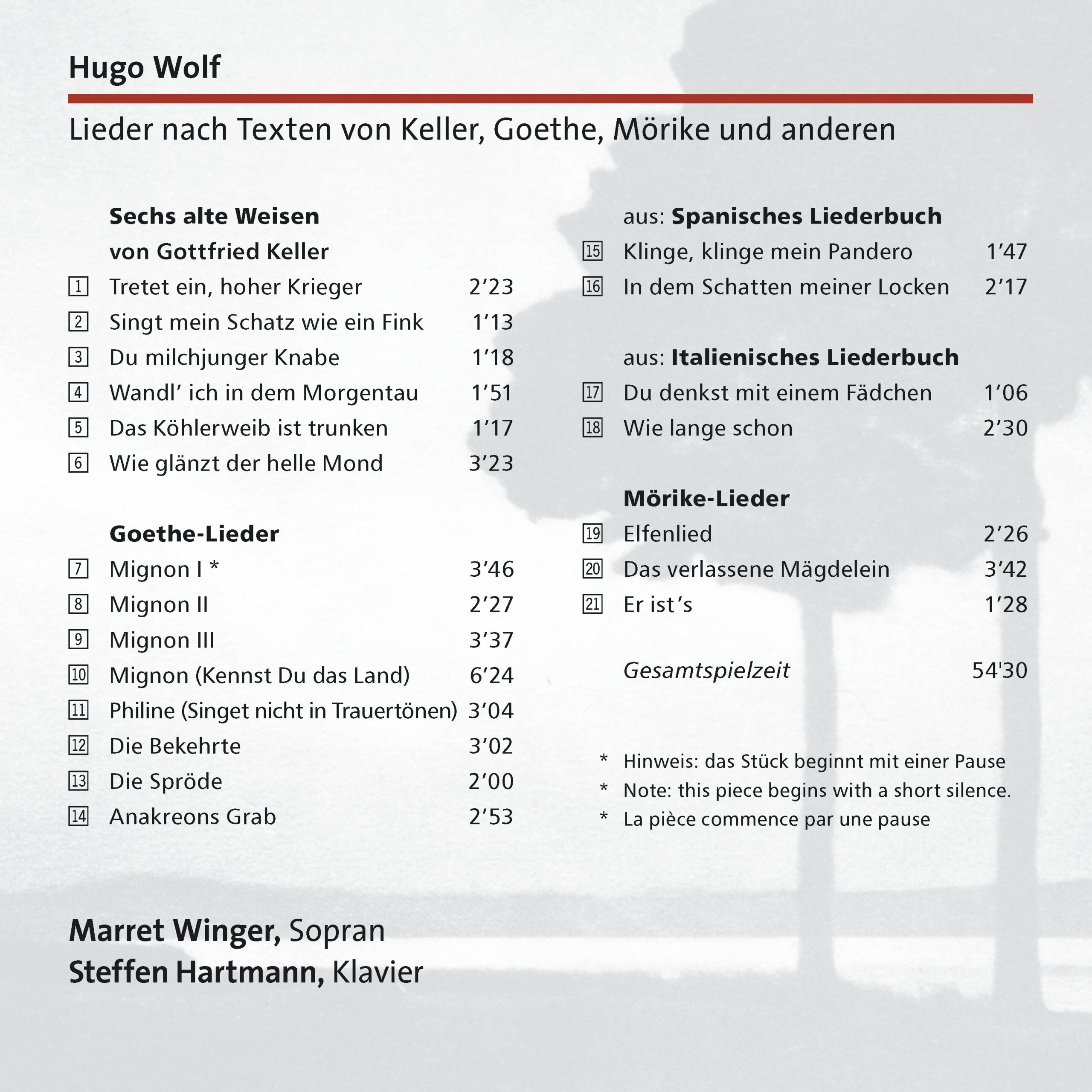

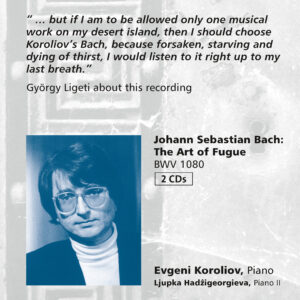


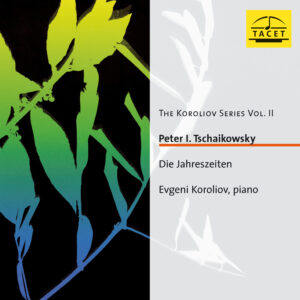
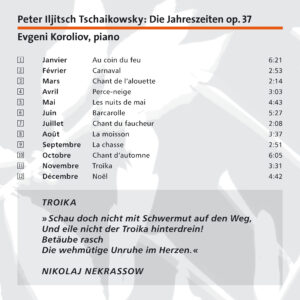

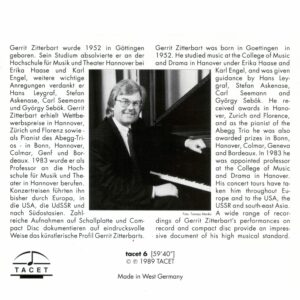
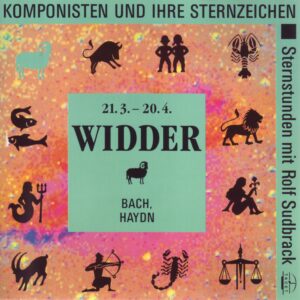
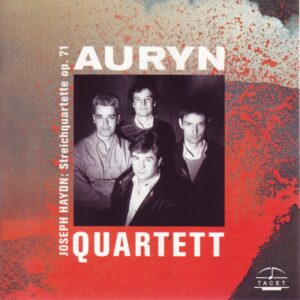
Pforzheimer Zeitung –
Marret Winger’s light, silvery-bright soprano proves ideal for the art songs of Hugo Wolf. Together with her piano partner Steffen Hartmann, she presents songs based on texts by Keller, Goethe, Mörike, and from the “Spanish Songbook.” Her voice, present in all registers, demonstrates both security in the high notes and impeccable intonation, as well as her artistry in interpretation. Less mannered than her teacher Elisabeth Schwarzkopf, she explores the varied moods and emotional states of the songs with exceptional textual clarity. Steffen Hartmann is her equal partner in this collaborative interpretation.
tw
Fanfare-Magazin –
In their wary correspondence, Schoenberg responds to Busoni’s call for perfection with the prickly retort,
"But I find perfection only in the work of carpenters, gardeners, pastry-cooks and hairdressers" (August 24, 1909). To the list add Lieder interpreters.
Winger and Hartmann have been performing together for a decade, hence their hand-in-glove projection as Winger’s soprano—rising from dark roots to become more brilliantly blonde, so to speak, as it ascends (resembling Schwarzkopf’s in her prime)—touches the lyrics with a loving caress, keeping one at one’s nerve ends throughout, as Hartmann animates Wolf’s orchestrally conceived accompaniments with an unaccustomed intimacy and finesse. "Er ist’s," for instance, usually a furious flurry on the piano through which the vocalist’s clarion soars ecstatically, becomes an exquisite rustle surrounding Winger’s almost whispered spring greeting. The ecstasy is palpable without being trumpeted. Less is piquantly more.
A master class with Fischer-Dieskau yielded this testimonial—
"Marret Winger showed herself to be a musician of real quality. Her voice is silvery, pleasing and well produced even in the middle and lower registers, and she also has a confident stage presence and communicates well with her audience." Perhaps the understatement owes to Winger’s subtlety, her penchant for coloring syllables discreetly without lapsing into the sort of bold italic underlining affectations marring so many of Fischer-Dieskau’s performances in the latter part of his career.
Descriptions of the Winger/Hartmann duo’s intimate scale may suggest pulled punches or expressive flattening, but this is not the upshot—through a range encompassing the hush of "Anakreons Grab" and the dramatic third strophe of "Kennst du das Land" all is vibrantly alive. "Das verlassene Mägdelein" spellbinds, while the agony in "Wie lange schon" is of another kind but palpable. Her seeming artlessness through the "Mignon" group calls Goethe’s adorable androgyne before us in all her fascinating complexity. And so on.
Within a spacious aural frame, voice and piano, taken very close and finely detailed, strike an ideal balance. Poems with translations are included. Splendidly realized and enthusiastically recommended.
Adrian Corleonis
Orpheus –
(...) The same can be said of Marret Winger, who also studied with Schwarzkopf and, in terms of vocal type, somewhat recalls Christine Schäfer. She now boldly presents a fabulous debut CD of Hugo Wolf songs (...). With her silvery timbre, beautifully resonant head notes, and exquisite textual clarity, she convincingly follows in her maestro’s footsteps. Winger particularly distinguishes herself as a first-rate Wolf interpreter with her renditions of “Kennst du das Land” and “Er ist’s.” It is heartening to see that, while major record labels often shy away from late Romantic song albums, there are still smaller companies willing to support such ambitious projects.
Erwähnung verdienen auch die trefflichen Begleiter der beiden Sängerinnen, die ein besonderes Fingerspitzengefühl bezeugen (…).
Scherzo, Spanien –
„disco excepcional“
Winger rightly revives the Wolfian interpretation style of a Irmgard Seefried or Elisabeth Schwarzkopf—both of whom she studied under. She possesses a playful and velvety voice, intuitive and infectious musicality, and brilliant articulation.
Sensitive and infectious
We know little about Winger, apart from an illustrious list of teachers under whom she studied between 2004 and 2007. In 2007, she made her debut with songs, oratorios, and operas (Despina, Zerlina, Anita—young roles that suit the graceful freshness of her voice). I stand corrected: thanks to this CD, we now know a great deal about Winger. She rightly revives the Wolfian interpretation style of Irmgard Seefried (another eternally youthful lyric soprano, possibly the finest interpreter of Wolf) and Elisabeth Schwarzkopf, in whose masterclasses she was a student. Winger possesses a playful, velvety voice, a determined vocal presence, sensitive and infectious musicality, and brilliant articulation.
Wolf’s world is demanding: complex, wild, full of surprising harmonic nuances, and encompassing a vast range of moods. Our artist navigates them all with masterfully talented ease—profound and intelligent, with compellingly beautiful efficiency and, in its myriad nuances, expressive élan. She moves from Mignon’s incredible pathos to Philine’s cheekiness, from Anacreon’s cool composure to the fairy-like magic of the elves, and the earthy rootedness of the Spanish songs. The poets set to music by Wolf—Goethe, Mörike, Geibel, Keller, and their peers—can rest content in their Olympian heights. The pianist, immersed in the joy of this dense dialogue, matches the soloist’s highest level, shaping the interludes that the composer entrusted to the instrument with equal artistry.
Blas Matamoro (Translation Spanish-German: Stefanie Brüning, translation German-English: automatic)
Pizzicato –
At first glance, one might regard such a CD with skepticism: a pure Hugo Wolf program featuring unknown names—this is dangerous territory! But the very first of the Six Old Sages by Gottfried Keller not only reassures, it stimulates, and the ear craves more. Here is a singer at work who unlocks Wolf’s often rugged sound world and fills the music with humanity. Marret Winger traces the subtle emotional nuances in both the texts and the music, expressing them with healthy conviction: naturally and without exaggeration, but always with heart and soul. This warm-hearted interpretation is paired with the sound of a silvery voice—trained, among others, by Elisabeth Schwarzkopf and Dietrich Fischer-Dieskau—distinguished by a very characteristic, light vibrato. (…) Alongside the Six Old Sages based on texts by Gottfried Keller, the program includes Goethe settings, three Mörike songs (Elfenlied, Das verlassene Mädchen, Er ist’s), and two pieces each from the Spanish and Italian Songbooks.
Besonders hervorzuheben ist die Begleitung durch Steffen Hartmann, der für die Sängerin ein ebenbürtiger musikalischer Partner ist und mit seiner starken, prägnanten Rhetorik ebensoviel zum Höreindruck beiträgt wie die Sängerin. Er spielt hochkonzentriert, voller Spontaneität und spannungsvoller Energie und betont die dramatischen Momente gerne mit zuweilen sehr kräftigen Tönen. Die Toningenieure haben das schlank klingende Klavier in eine optimale Balance zum Gesang gebracht, was ein weiteres Plus dieser CD ist, bei der sich alle Fragezeichen, die man sich anfangs stellte, aufgelöst werden.
ReF
Concerti –
Only the finest poetry could inspire him: Hugo Wolf. For their exquisite CD recording, the brilliant late Romantic song composer’s settings of poems by Keller, Goethe, and Mörike have been selected by Marret Winger and Steffen Hartmann. The young lyric soprano’s richly modulated, nobly timbred voice is ideally suited to Wolf. She articulates with crystal-clear diction, shaping each song with precision—just as Wolf’s art demands, she sensitively traces every textual nuance. At her side is Steffen Hartmann, an equal partner at the piano: never servile, always setting accents, empathetic, and deeply knowledgeable. Both artists devote themselves to the intimate art of song with the utmost dedication. Here, technical mastery and intelligent interpretive power come together perfectly.
Musik Forum April-Juni 2008, Nr. 2 –
The small but distinguished label TACET pulls off a surprise with the debut CD by the young, highly promising soprano Marret Winger and her collaborator Steffen Hartmann. The 21 selected songs span a wide emotional spectrum—from Goethe’s serious Mignon songs to light-footed, ironic Keller settings, from sun-drenched examples from the Spanish and Italian Songbooks to fragile yet exuberant Mörike songs. The overarching theme is love: love that succeeds, but also love that fails or shatters.
Marret Winger explores the resulting emotional worlds with admirable intensity, fully immersing herself—alongside her excellent collaborator—in each mood, achieving authenticity through a natural and direct approach. Her clear, technically masterful voice, with its warm and sympathetic timbre, leaves nothing to be desired, whether in the high register (Elfenlied) or the low (Anakreons Grab; Mignon). She effortlessly navigates challenging register shifts (Elfenlied) and perfectly captures Wolf’s melodic essence. Winger is especially expressive when she reins in her voice, using a parlando style to create an almost mimetic suggestion for the listener (Du milchjunger Knabe; Philine).
Yet her voice also possesses a distinctly dramatic quality, which serves her intense portrayal of Mignon’s song (Kennst du das Land) to great effect. The same holds true for the ballad-like impact of the fifth Keller song (Das Köhlerweib ist trunken), as well as the composer’s prescribed grand crescendos that heighten the emotional intensity (Er ist’s; Mignon songs).
Winger’s articulation is flawless; with her remarkably nuanced voice, she delves deeply into each character. Time and again, you can almost feel her joy in interpretation (Klinge, klinge mein Pandero; Die Spröde). She performs with both spirited exuberance and inner detachment, revealing the deeper structure of the text.
She is supported at the piano by Steffen Hartmann with near-perfect synergy. He sensitively complements her in the expressive passages, while also using virtuoso, bold sonorities to create vivid shifts in mood.
Finally, the excellent recording quality deserves special mention. The very present yet smooth mixing creates the impression of being right in the midst of the performance. Once again, TACET’s recording philosophy impresses with its harmonious blend of artists and production.
Given the success of this CD, it’s easy to understand why Marret Winger’s passion—according to the booklet—lies especially in the art of song. "Tretet ein" ("Enter in"), the motto of the first song, could symbolically represent the promising path ahead for this singer, which will surely reveal even more delightful surprises.
Klaus-Jürgen Etzold
Audiophile Audition –
Hugo Wolf was an arch-romantic; dead at 42, at least one suicide attempt, final years in a mental institution, disciple of Schopenhauer (as was his idol Wagner), his sensitivity produced some of the most magnificent songs ever penned. Where Schubert, Schumann, and Brahms stopped, Wolf took off. The songs he set--simple looking from a textual standpoint--were given varied treatments that gave new life to each succeeding verse. His chromatic manipulation of the melodic line added a new depth of expression that may well have made him the most expressive exponent of the lied in the Romantic age.
German singer whose career has so far been a European one, though she studied with Elizabeth Schwarzkopf, Edith Mathis, and attended master classes with Fischer-Dieskau and Elly Ameling. Her vibrato surprised me; it is that older style, very intense and fast, actually a very pleasant change from much of what we hear today. It allows the words to be caressed in a very cherished and warm manner that does indeed remind one of Schwarzkopf. My only criticism would be that sometimes the lower register seems on the verge of giving out. Yet her enthusiasm for these songs more than makes up for any deficiencies.
Overall this is a nicely done bit of singing, with a composer who benefits greatly from this sort of undivided vocal attention. The sound is clear and resonant, with the piano accompaniment refined and satisfactorily blended.
Steven Ritter
Klassik heute –
They say the art of song is dead—no singers, no listeners! But is it really as dire as some claim? There is, in fact, evidence to the contrary, and this CD presents a highly compelling argument. The very fact that young soprano Marret Winger and her pianist Steffen Hartmann chose a pure Hugo Wolf program for their debut recording is noteworthy, as most debutants prefer a less challenging path. Wolf’s songs are among the most demanding in vocal art—difficult to sing, to play, and perhaps even to listen to. They require great empathy from both artists and audiences to immerse themselves in the intricately woven, often mysterious sound world of these works. Fortunate are those who have found the "key" that unlocks this musical wonderland. What Marret Winger brings to the table is impressive: training under the giants of song interpretation—particularly of Wolf’s songs—Schwarzkopf and Fischer-Dieskau. She possesses a beautiful, resonant voice, distinguished by a distinctive, undulating vibrato that sets her apart from the many standardized voices of today. There is a healthy core to her voice, as well as the power for grand expressions. Her performance is particularly praiseworthy for its cool restraint. Songs from the Italian and Spanish Songbooks often tempt singers into coquettish and affected mannerisms, but Winger avoids this entirely, without neglecting the textual nuances. The Six Old Sages based on texts by Gottfried Keller, Goethe’s Mignon songs, along with Die Bekehrte, Die Spröde, Anakreons Grab, and three Mörike settings (Elfenlied, Das verlassene Mädchen, Er ist’s)—all are delivered with great skill and assured artistry.
Steffen Hartmann’s piano playing deserves special recognition. Here is a sensitive, technically refined artist at work—one who also engages intellectually with the compositions, as evidenced by his insightful introduction to the works in the booklet. The booklet also includes the song texts in both German and English.
Clemens Höslinger